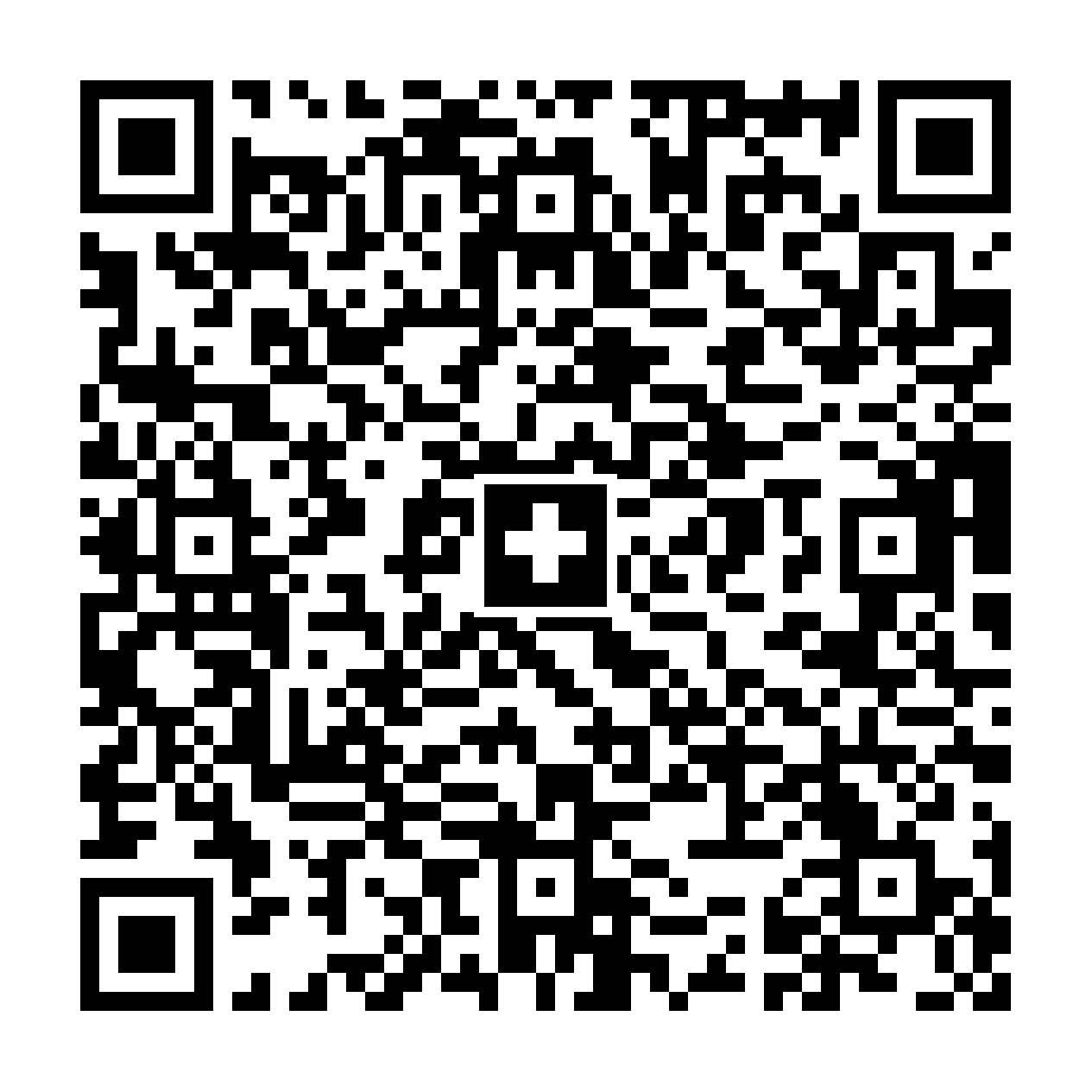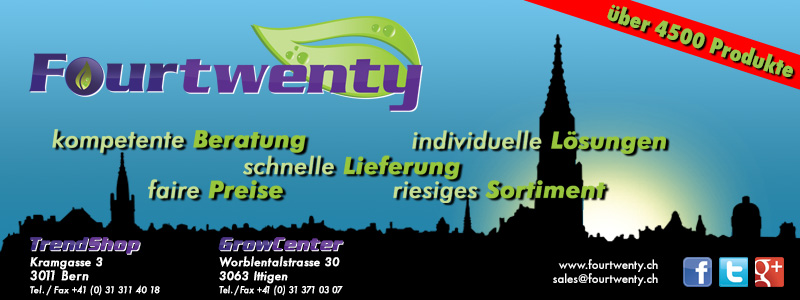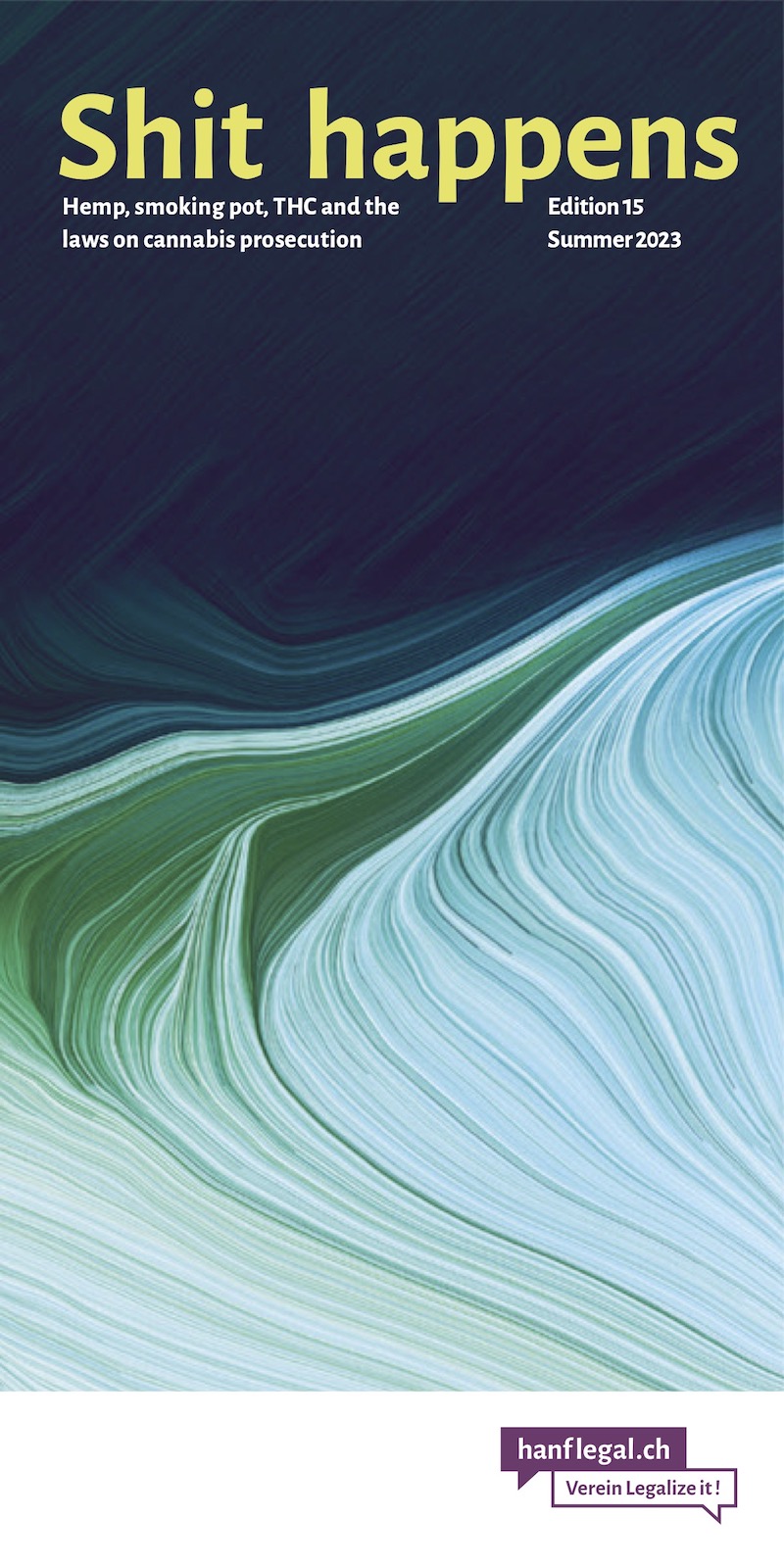- THC & Law:
Table of Contents
Strongly illegal: Driving with THC in the blood
Laws
THC in blood decides
Traffic Regulation Ordinance VRV, SR 741.11, 1st part, 1st section, Art. 2, paragraph 2, point a, in the PDF (2023) on page 2
Limit value for THC in blood
Ordinance FEDRO to the Road Traffic Control Ordinance, SR 741.013.1, 6th section, art. 34, point a (1.5 micrograms per liter), in PDF (2023) on page 12
Conditions
A single number from a measuring device decides whether someone has committed a misdemeanor, even if nothing else has occurred and even if no abnormalities are found in the medical examination: the suspect is therefore fairly certain to be fit to drive.
Tips
Difficult topic! Actually, you have to decide: either smoke pot or drive a car. And we don't mean being abstinent for one night and then hoping it will be okay. No, either drive a car and never smoke weed or smoke weed but then never drive a car. Everything else is very risky.
Penalties
The penalty is high because it is a misdemeanor. There is a fine, plus monetary penalty, fees and investigation costs (together quickly over 2,000 francs), plus a criminal record entry, withdrawal of the driver's licence for at least three months and clarification of the fitness to drive by the road traffic office.
Advertisement
Strongly illegal: Driving with THC in the blood
Concrete examination or blood values?
In the past, a doctor had to conduct a specific examination to determine whether or not a driver was fit to drive. But since the introduction of zero tolerance in 2005, the detection of THC in the blood is sufficient to prove driving incapacity.
The regulation states that “tetrahydrocannabinol (cannabis)” detected in the blood will result in inability to drive. This constitutes a misdemeanor (strongly illegal) and is punished accordingly. In addition, there is a temporary withdrawal of identification and then the procedure at the road traffic office.
The detection in blood
When the blood is examined in the laboratory, the amount of THC present in it can be determined. It is expressed in nanograms per milliliter of blood (ng/ml) or micrograms per liter of blood (µg/l). (The same applies to alcohol: the alcohol content can be determined in the blood and breath.) But what does the active substance content in the blood tell us? Can these values be used to determine whether a person is actually stoned or alcoholized? In the case of alcohol, the law says yes and states that more than 0.5 per mille (blood) or 0.25 mg/l (exhaled air) is not permitted for driving a vehicle. Conversely, this means that someone with 0.4 per mille alcohol may drive a car (with the exception of professional drivers and learner drivers, driving instructors and people accompanying learner drivers).
For illegal drugs, however, the limit is supposed to be zero, or the limit of what the measuring device can just measure (about one microgram per liter). With the ordinance introduced in 2005, the presence of an extremely small amount of THC in the blood is sufficient to determine the inability to drive: the detection limit is 1.5 µg/l. The average amount of THC measured in the blood is zero, or the limit of what the measuring device can just measure (about one microgram per liter). From the measured THC average value, 30 % is subtracted. A measured blood value of 2.2 is then sufficient for the detection of THC in the blood and thus the inability to drive is proven, even if no abnormalities can be detected in the driver.
This is an extremely low value, which has nothing to do with a concrete stoned state / impairment. Shortly after consumption, values of dozens to over 100 micrograms per liter of blood can be measured.
How long after consumption does the THC level in the blood remain above 1.5 µg/l?
This varies greatly from person to person and according to the amount consumed. Someone who only “smokes one” every few weeks may be below this value after six hours. But those who consume daily may always have a higher value. This would only fall below 1.5 after several days of abstinence.
What does this mean for THC users?
Thus, someone who smokes pot occasionally should not have smoked pot for at least six hours before driving. On the other hand, someone who smokes pot regularly is never considered fit to drive, unless he / she would skip smoking pot for three days before driving. Here we can clearly see that zero tolerance goes far beyond the goal of removing only those who are unfit to drive. It makes legal driving impossible for people who regularly consume THC, even if they always put a night between consumption and driving!
Part 1: Police checks in road traffic
Occasions for police traffic stops:
- A real error in driving a motor vehicle (e.g., crossing a safety line, speeding, a defective light, or being involved in an accident).
- driving slowly, e.g. because someone is unfamiliar with the location
- a large-scale traffic control without specific reason
- Targeted search for people who have previously attracted attention with cannabis.
Once a police check is underway, the smell of cannabis, reddened eyes or an entry for cannabis in the police database or criminal record can lead to further investigations: Search of the car, the driver, the passenger…
A quick drug test may actually only be carried out if there is a concrete suspicion of impaired driving ability: smoking pot at the wheel, red eyes, unsafe driving style, unclear pronunciation, carrying cannabis, etc. In fact, however, the police have a clear mandate here. In fact, however, the police have enormous leeway here.
Some police forces still carry out the rapid tests, which normally detect THC-COOH in saliva or urine. If such a test is positive, a medical examination and a THC blood test in hospital can be ordered. This is because THC-COOH is not legally relevant for driving under the influence of drugs. Here, only the THC value in the blood counts.
Other police forces have introduced new testing procedures that do not require the (inaccurate) rapid drug tests. Here, the driver is questioned by the police in a standardized manner for three minutes and, based on the answers and visible elements (salivation, eye behavior, etc.), the police decide whether they want to take the person to the hospital for more detailed clarification. If they want to do so, the police must:
- question the suspects and make a protocol
- chauffeur her to the hospital for the blood test
- temporarily revoke the driver's license
- report the suspects to public prosecutor
- Report to the road traffic office.
Medical examination in hospital
In the hospital, the persons concerned are examined by a doctor and the result is recorded. However, this specific examination is of little value in the case of drug use. Even if the result is “no abnormalities” (as is very often the case), this is of no use to the person concerned: only the result of the blood test is decisive. (If the medical examination finds abnormalities, however, there may be further problems). It can take weeks or months for the blood to be tested. The driver's license remains confiscated or is returned with reservations.
Three substances are measured in the blood:
- THC (tetrahydrocannabinol)
- OH-THC (hydroxy-THC)
- THC-COOH (THC carboxylic acid)
The THC value is decisive for the concrete driving ability. OH-THC is not relevant (so far). The THC-COOH value is relevant for the general fitness to drive, it gives information about the consumed quantity.
All three substances are measured in micrograms per liter of blood (µg/l). High values are for example 23-7-210, low 2-1-30.
Summary penalty order from the public prosecutor
The police report, the results of the medical examination and the results of the blood test are sent to public prosecutor. Based on these, the latter prepares a summary penalty order. There are two different variants:
Variant 1
⇒ The THC level in the blood is below 1.5 micrograms per liter of blood (or 2.2 incl. safety margin):
⇒ summary penalty order due to consumption
THC in blood is detected, but below the amount relevant for traffic law. Nevertheless, this proves illegal THC consumption and this is punished (fine).
The costs for the examination (over 1,000 francs) are charged to the accused, so that the bill comes to over 2,000 francs.
This is only permissible if there is a concrete suspicion, but there is a tendency to simply try to impose the costs on the persons concerned.
Variant 2
⇒ The THC value in the blood is at least 1.5 micrograms per liter of blood (or 2.2 including safety margin):
⇒ summary penalty order for driving under the influence of drugs
Here, the illegal THC consumption is only the smaller part of the punishment (contravention), really illegal is driving under drugs (misdemeanor). This is legally proven with such a value.
Now there is beside a fine for the consumption still a monetary penalty (10 to 40 daily rates) for the driving under the effects of drugs, the costs of the hospital are to be paid likewise. The driver's license is revoked for three months. There is an entry in the criminal record, so you have a criminal record.
In both variants, the road traffic office is also informed of the incident.
Part 2: Consequences of a police check outside road traffic
A classic case is THC use outside, where someone is caught by the police and confesses to daily use in the interview, for example.
A hefty party or a loud argument at home can lead to the police stopping by and thus seeing pot paraphernalia. Then a protocol is taken and also asked about the frequency of consumption.
Or a cyclist or pedestrian is involved in an accident, for example at a pedestrian crossing. In this case, blood samples are ordered from all those involved and interviews are also conducted.
⇒ Depending on the incident, the police report the person concerned for consumption, disturbance of the peace, etc. and file a report with the road traffic authorities (if they have a driving license), even if the incident has nothing to do with motorized road traffic.
Part 3: Measures taken by the Road Traffic Office
If the road traffic licensing authority is informed for any reason (e.g. by the police) that a person with a driver's license has used THC, it checks whether the person's cannabis use poses a risk to road traffic. If this is the case (e.g. because the person concerned has been found to be driving under the influence of drugs or regularly consuming drugs), a precautionary revocation of the driver's license may be imposed for an indefinite period of time.
⇒ If it is only a matter of confessed consumption of once or twice a week and this is in no way connected with road traffic, the STVA normally takes no action. Likewise, if the THC-COOH content is below 40 µg/l (if the result of a blood test is available). The matter is then closed (but remains on file).
⇒ If THC above 1.5 µg/l has been legally detected at the wheel, a fitness to drive assessment is initiated. Likewise, if the THC is below 1.5 but consumption of more than twice a week is reported and also if the THC COOH value is above 40. Carrying cannabis also raises doubts about fitness to drive (no separation of consumption and road traffic). This all then runs under “suspicion of drug addiction”.
Traffic medical report
A urine test (negative for THC?), possibly a hair analysis (if other substances or alcohol dependency are suspected) and an interview (abstinence ensured?, legal regulations accepted?, no increased risk in road traffic?) are included in a traffic medical report (costs over 1,500 francs). The report then recommends whether the person under investigation can be granted fitness to drive and whether there should be conditions attached to this, i.e. whether fitness to drive can be approved without conditions:
- can be endorsed without conditions
- can be endorsed with conditions
- should be rejected.
Based on this opinion, the decision of the Road Traffic Office is made. The driver's license is issued depending on:
- redelivered without conditions
- reissued with conditions (depending on the case, these vary from urine tests over half a year, a whole year or two years; possibly with further traffic medical reports every 6 or 12 months)
- not issued again (withdrawal for security). First, a further three or six months of THC abstinence must then be documented before a possible issuance of the driver's license is discussed - then also with the described conditions.
Abstinence control
A urine check in the hospital costs over 200 francs and usually has to be dispensed once a month. This results in costs of around 3,000 francs per year. If urine tests can be carried out by the family doctor, it is much cheaper (around 5 to 60 francs, depending on the billing method).
Ultimately, the authorities simply want to see total abstinence if the driver's licence is to be retained: negative urine tests; clear demarcation from previous consumption; insight that life is better without consumption (with concrete examples); that one has contact with other, abstinent people and no longer with THC users. Increasingly, they also want to know whether there is a shift to alcohol consumption (hair samples are then requested for this).
If all requirements have been fulfilled and the fitness to drive is approved without restriction, the driver's license is returned without conditions. Otherwise the mills of the road traffic office continue to grind.
THC use or driver's license
Since urine samples remain positive for a very long time after consumption and the limit is reached quickly, affected persons really have to think about this: Driver's license or THC consumption? Those who want or need to keep the driver's licence can no longer continue to consume THC. Even legal hemp products without psychoactive effects may no longer be consumed, as they too can lead to positive urine samples (see food and CBD hemp).
The "THCs"
Three values are determined in the blood:
THC: active substance, legally relevant. Driving under the influence of drugs is considered proven from 1.5 µg/l.
OH-THC: active substance, legally not relevant.
THC-COOH: degradation product, legally indirectly relevant, because above 40 µg/l is considered an indication of possible drug addiction.
Road Traffic Office
The Road Traffic Office is responsible for clarifying the general fitness to drive, i.e. whether someone is still allowed to have a driver's license at all (drug addiction rules this out). For this purpose, it has expert opinions drawn up and decides on measures (security withdrawal, controlled abstinence).
Drug addiction?
The consensus opinion in forensic medicine is that consumption of once to twice a week is still just tolerable (occasional consumption). As of three times a week, they assume “no longer occasional/frequent consumption”, which should justify a suspicion of drug addiction.
public prosecutor
The public prosecutor conducts the criminal proceedings. For the punishment, it is only relevant whether someone has driven a car with at least 1.5 µg/l THC in the blood. If this is the case, the public prosecutor will issue a summary penalty order for driving under the influence of drugs (which is misdemeanor ).
Penalties for driving under THC
A federal court ruling puts certain points into perspective.
However, this still needs to be clarified in more detail, because most cases end with a conviction.
Discontinuation orders
Repeat offense during the probationary period
The first time, the penalty for driving under the influence of drugs is usually conditional, so you don't have to pay the costs for the daily fines (but the fine, fees and other costs do). But if you are caught again during the probationary period, it can quickly become enormously expensive. In this case, the prosecutor can revoke the old penalty and form a new penalty from the old and the new case.
Overview and summaries
Concrete cases driver's license
Leaflets and directives
Report on THC limits (2020)
An interesting report from the Institute of Forensic Medicine of the University of Basel on the subject of THC in the blood and driving ability/ability to drive. However, we would like to point out: This is a discussion paper and not yet implemented in current law!
Institute of Forensic Medicine Zurich:
Swiss Society of Forensic Medicine SGRM:
Road Traffic Act and Regulations
Traffic Rules Ordinance
Traffic Approval Ordinance
Advertisement
Support our work with a donation:
Bank transfer
Account number (IBAN):
CH02 0900 0000 8709 1354 3
Full account details
Or scan this QR code with your eBanking App (ZKB, Revolut, Postfinance, …):

Or open/share the QR code as PDF file with your eBanking App.
Credit card
Donate via credit card
Verein Legalize it!
Quellenstrasse 25
8005 Zürich
Threema ID 7NH65RBY
Don’t miss anything! Follow us on social media:

